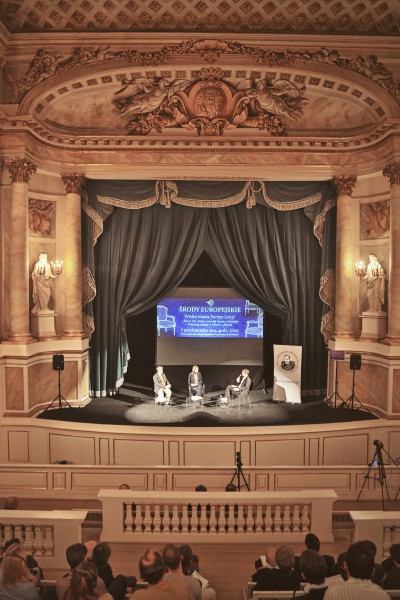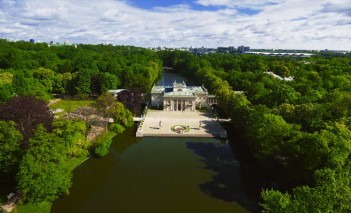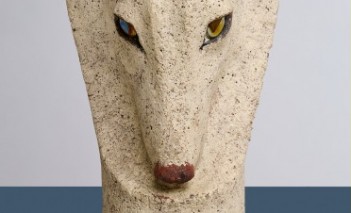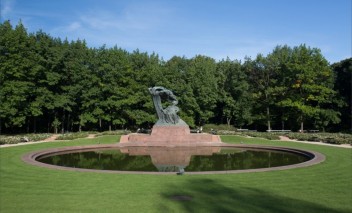Debate on EU in the Royal Theatre. "Europe must wake up"
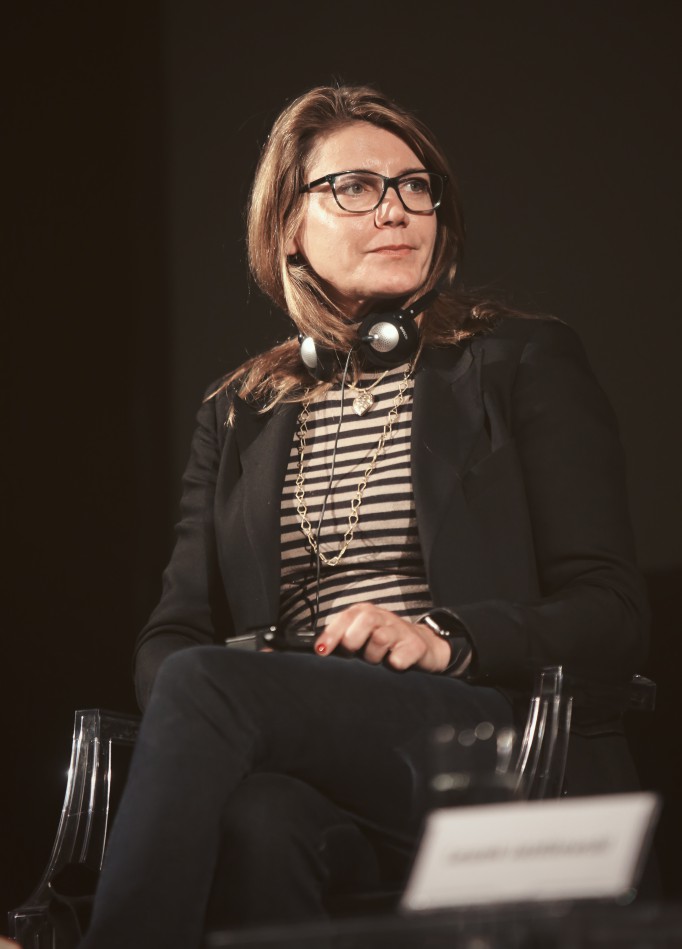
- My goal was to make a film that would get through to people and stun them. Europe must wake up and such a signal must come from the society - Annalisa Piras, the producer of the "The Great European Disaster Movie" said. The Polish premiere of the documentary as well as the accompanying debate on the future of EU took place in the Royal Theatre in the Old Orangery as part of the “European Wednesdays" organised by the Royal Łazienki and Professor Bronisław Geremek Foundation Centre.
- We are initiating a debate and perversely asking ourselves if Europe is a utopia - Tadeusz Zielniewicz, Director of the Royal Łazienki, said opening another "European Wednesday". He stressed at the same time that the opportunity came with "The Great European Disaster Movie", the premiere of which in the Royal Theatre was preceded by a discussion about the European Union.
Director Zielniewicz added also that one year ago, when the "European Wednesdays" were initiated, no one thought that the meetings would become so up-to-date because of the need of discussions on the future of EU.
The theme of the debate in the Royal Theatre focused precisely on the European crisis and questions on the future fate of the Union, which had been raised in "The Great European Disaster Movie" by Annalisa Piras. The debate was attended by the producer of the documentary, Marek Cichocki, expert in European matters, and journalist and chief editor of the Liberte! magazine Leszek Jażdżewski, who moderated the discussion.
- My goal was to make a film that would get through to people and stun them. That would stir up emotions which were at the origin of the European Union project. I thought that if no one is stunned, it will be a failure - the producer said, stressing at the same time that the film she had created was shown - during the “European Wednesday" - for the first time in Central and Eastern Europe.
In her view, as a result of problems that EU is facing, such as the Russian expansion or the migration crisis, "Europe must wake up and such a signal must come from the society". - A storm is approaching Europe. The inhabitants of EU should open their eyes and demand from their country leaders to resolve European issues - stated Annalisa Piras.
The producer pointed out that, in her opinion, although Europe is facing another crisis connected with mass migration, a debate on EU became impossible and that it was a serious issue today. - We are in a critical moment, and yet we are not able to discuss. People don’t want to speak about Europeanism because they are tired of it. Whereas it is the moment when people should act - emphasised the producer.
She added that what may induce them to do it is the shock caused by a warning about the consequences of the collapse of the EU project. Hence this form of her film, and not a different one.
- The gloominess of the film matches well the state of the spirit of the Europeans, although I didn’t suspect that they were so pessimistic. I thought that there was more optimism in Europe - Marek Cichocki, expert in European matters, said during the debate in the Royal Theatre.
In his opinion, Europeans became prophets of doom; it is not good since it excludes a good strategy for the future. - The main issue with the EU project consists in the fact that no one believes in it now and thus no one wants to undertake any risky actions. There is no idea that would encourage people to defend it apart from fear of losing what EU is giving - Cichocki said.
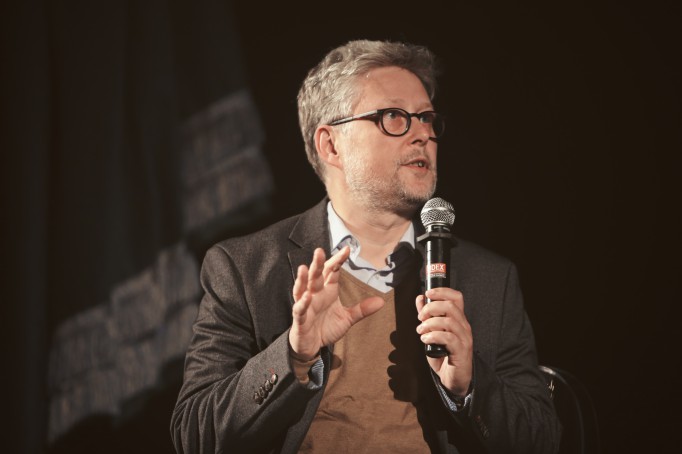
Also the audience in the room engaged in the discussion. Experts were asked about a possible reaction of China to the break-up of EU and also why the Europeans “were building walls” in form of nationalism.
- The break-up of EU would constitute a big problem for the United States. China would not be worried as it likes watching the tigers (EU and USA) eating each other; Russia would be the happiest of course as it could pursue its interests - Marek Cichocki explained.
Annalisa Piras stressed that she agreed with that opinion. She added that the hope for EU would be to regain the democratic process, and young people should be mobilized for this purpose. - Let’s return to what is great. Common values and open borders - Annalisa Piras called.
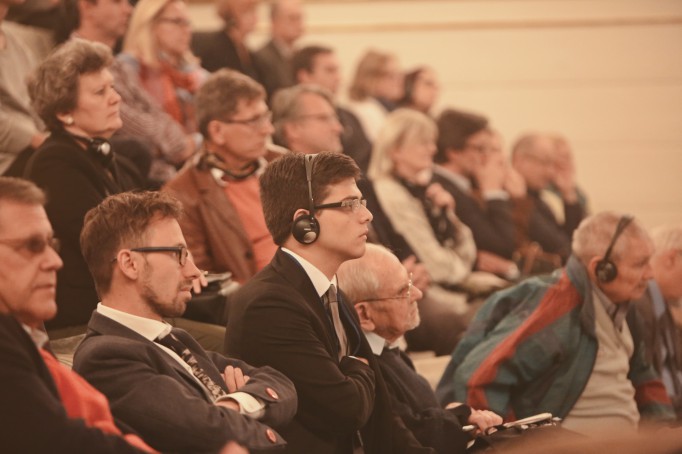
“The Great European Disaster Movie” did not go unnoticed, as the producer expected. When it was shown by BBC in March, it caused a lot of controversies in Europe and provoked a discussion in the media engaging major European newspapers, including The Guardian, The Huffington Post, La Stampa, Le Republica and L’Espresso.
It tells a story of a hypothetical, not distant future, in which the European Union has ceased to exist and the continent is plunging into a crisis.
Through stories of ordinary people, interlarded with interviews with experts and expressive frames showing, among other things, World War II or the bloody conflict in the Balkans, it depicts Europe which will break up if nothing changes. Whereas we must fight for it, as Annalisa Piras claims.
"European Wednesdays. Is Europe a utopia?" - open debates organized by the Royal Łazienki Museum and Professor Bronisław Geremek Foundation Centre during which eminent experts reflect on the identity of Europe. The debates are held simultaneously in partner institutions of the Royal Łazienki Museum: Lunéville Castle in France and Prince Pückler’s Park in Bad Muskau in Germany.
